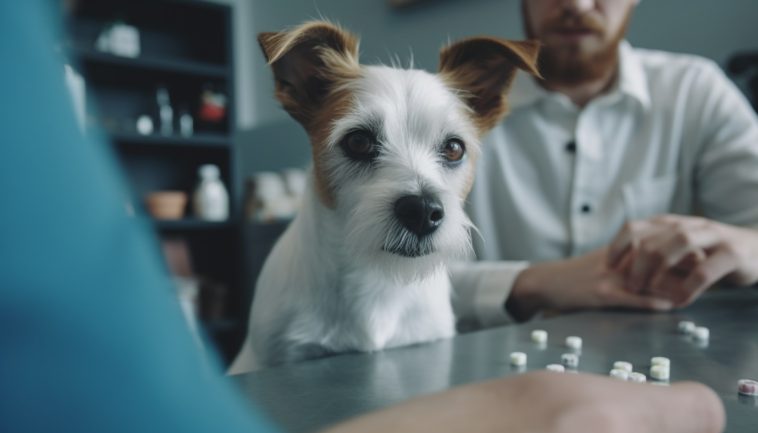Owning a dog is a joyful experience, but it also comes with great responsibility. Your dog relies on you for their health, happiness, and well-being. From regular check-ups to mental stimulation, there are many ways to ensure your furry friend stays healthy and content. In this article, we’ll go over 10 essential tips for keeping your dog healthy, with plenty of detailed information to help you give your pet the best care possible.
1. Regular Veterinary Check-ups

Taking your dog to the vet regularly is one of the most important things you can do to ensure their health. Routine check-ups allow for early detection of diseases and help maintain your dog’s overall health.
- Why Regular Vet Visits Matter: Dogs age faster than humans, meaning their health can change quickly. Routine visits to the vet allow for early detection of potential health problems such as dental disease, arthritis, allergies, and more severe conditions like heart disease or cancer.
- How Often Should You Visit the Vet?: Adult dogs generally need to see the vet at least once a year, while puppies and senior dogs may require more frequent check-ups. Your vet may also recommend annual blood tests, vaccinations, and other health screenings depending on your dog’s breed and age.
- Preventive Care: During regular vet visits, you can also discuss flea, tick, and heartworm preventatives, as well as dietary recommendations to keep your dog in top shape.
2. Feed a Balanced and Nutritious Diet
Diet is the cornerstone of good health for your dog. Providing them with the right nutrients helps maintain their energy levels, strengthens their immune system, and keeps their coat shiny and healthy.
- The Importance of a Balanced Diet: A diet rich in high-quality proteins, healthy fats, and essential vitamins is crucial for a dog’s overall health. The food should match their age, size, and activity level. For example, puppies need more protein for growth, while senior dogs may benefit from diets tailored to their aging bodies.
- Choosing the Right Food: There are various options, including dry kibble, canned food, grain-free diets, and even raw food diets. It’s important to choose the right one based on your dog’s needs. Consult your vet to determine if your dog requires a specific diet due to health concerns such as allergies, obesity, or digestive issues.
- Avoid Harmful Foods: Keep in mind that some human foods can be toxic to dogs, such as chocolate, grapes, onions, and xylitol. Always stick to dog-approved treats and meals.
3. Exercise for Physical and Mental Health

Dogs need regular physical activity to stay healthy, both physically and mentally. Exercise not only prevents obesity but also helps release pent-up energy, reducing destructive behaviors.
- Why Exercise is Vital: Just like humans, dogs can suffer from weight-related health problems if they are not active enough. Regular exercise strengthens their heart, muscles, and joints while improving their digestion and metabolism.
- Types of Exercise: The amount and type of exercise your dog needs depends on its breed, age, and energy levels. For instance, high-energy breeds like Border Collies or Retrievers may need over an hour of intense exercise a day, while smaller or older dogs may require shorter walks and playtime. Activities like running, fetching, hiking, or even swimming can be incorporated into your dog’s routine.
- Mental Stimulation Through Exercise: Exercise doesn’t just tire out the body—it engages the mind too. Training sessions, puzzle toys, and agility courses can help keep your dog mentally sharp and reduce boredom.
4. Grooming and Hygiene
Proper grooming not only keeps your dog looking and smelling good, but it also prevents various health problems. Regular grooming helps you detect any early signs of skin issues, parasites, or infections.
- Brushing: Regular brushing keeps your dog’s coat healthy by distributing natural oils, preventing matting, and reducing shedding. Brushing also helps remove dirt, dead hair, and dander from their coat. Long-haired breeds may need to be brushed daily, while short-haired dogs might only need brushing once a week.
- Bathing: How often you bathe your dog depends on its breed and activity level. Most dogs benefit from a bath every 4-6 weeks, but some dogs with skin conditions may need more frequent baths. Always use a dog-specific shampoo, as human products can dry out your dog’s skin.
- Nail Trimming and Ear Cleaning: Overgrown nails can cause discomfort and affect your dog’s gait. Regular nail trimming helps prevent these problems. Additionally, ear cleaning is crucial, especially for breeds with floppy ears, as they are more prone to ear infections.
5. Dental Care

Dental health is often overlooked by pet owners, but it is just as important as other aspects of care. Poor oral hygiene can lead to plaque buildup, gum disease, tooth decay, and even infections that can spread to other organs.
- Brushing Your Dog’s Teeth: Ideally, you should brush your dog’s teeth daily, but even a few times a week can make a big difference. Use a dog-specific toothbrush and toothpaste, as human toothpaste can be harmful to pets.
- Dental Chews and Toys: In addition to brushing, providing your dog with dental chews or toys can help reduce plaque and tartar buildup. Regular vet checkups should also include a dental examination to assess your dog’s oral health.
- The Importance of Professional Cleanings: Depending on your dog’s oral health, your vet may recommend professional dental cleanings to prevent gum disease and other dental issues.
6. Hydration
Water is essential for your dog’s health. It keeps their body functioning properly, helps with digestion, and regulates body temperature. Always ensure that your dog has access to clean, fresh water.
- How Much Water Does Your Dog Need?: The general rule is that dogs should drink about one ounce of water per pound of body weight per day. However, more active dogs or those living in hot climates may need more.
- Signs of Dehydration: Make sure to watch for signs of dehydration, especially in hot weather. Symptoms include dry gums, excessive panting, lethargy, and loss of skin elasticity.
7. Preventative Medications

Preventative care is crucial for protecting your dog from common health problems like fleas, ticks, and heartworms. These parasites can cause severe health issues if not treated or prevented.
- Flea and Tick Prevention: Fleas and ticks can not only cause discomfort but also transmit diseases like Lyme disease. Use monthly flea and tick preventatives recommended by your vet.
- Heartworm Prevention: Heartworm is a serious and potentially fatal disease spread by mosquitoes. Monthly heartworm preventatives, either oral or topical, can protect your dog from this dangerous condition.
- Routine Vaccinations: Keeping your dog’s vaccinations up to date is essential for preventing illnesses such as rabies, parvovirus, and distemper.
8. Mental Stimulation and Enrichment
Just like humans, dogs need mental stimulation to stay happy and avoid boredom. Boredom can lead to behavioral problems like chewing, digging, or excessive barking.
- Why Mental Stimulation Matters: Mental exercise is just as important as physical exercise. It keeps your dog’s brain engaged and helps prevent anxiety or destructive behaviors caused by boredom.
- Interactive Toys and Games: Puzzle toys, treat dispensers, and training exercises can challenge your dog’s mind. Games like hide-and-seek, fetch, or scent tracking are fun ways to keep your dog mentally engaged.
- Training Sessions: Regular obedience training or learning new tricks can keep your dog mentally sharp and strengthen the bond between you and your pet.
9. Socialization

Socializing your dog from a young age is essential for helping them develop good behavior around other dogs, people, and in new environments. A well-socialized dog is generally more confident and less likely to develop anxiety or aggression.
- Why Socialization is Important: Dogs that are not properly socialized may become fearful or aggressive in unfamiliar situations. Early socialization helps them feel comfortable and relaxed around new people, other pets, and different environments.
- Socialization Opportunities: Puppy classes, trips to the dog park, and playdates with other dogs can help your dog develop social skills. Even adult dogs benefit from continued socialization to prevent behavioral problems.
10. Watch for Health Warning Signs
Dogs can’t tell us when something is wrong, so it’s important to keep an eye out for any changes in their behavior, eating habits, or physical condition. Early detection of health problems can make a huge difference in treatment success.
- What to Watch For: Symptoms like vomiting, diarrhea, lethargy, coughing, difficulty breathing, or changes in appetite and water intake may signal underlying health issues. If you notice any of these symptoms, contact your vet immediately.
- Regular Health Monitoring: Regular checkups and routine monitoring of your dog’s behavior, weight, and energy levels can help detect potential issues before they become serious.
Conclusion
Caring for a dog goes beyond feeding and walking them. Ensuring your dog’s health and happiness requires a holistic approach that includes regular vet visits, proper nutrition, exercise, grooming, and mental stimulation. By following these 10 essential tips, you can provide your dog with the care they need to lead a healthy, joyful, and fulfilling life.

